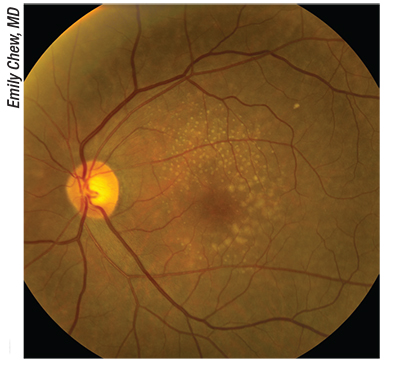In a recently published study, a secondary analysis of patients enrolled in the Age-Related Eye Disease Study was conducted to determine whether an association exists between dietary and supplementary calcium intake and age-related macular degeneration.
Emily Chew, MD, director of the division of epidemiology and clinical applications at the National Eye Institute at the National Institutes of Health, conducted the retrospective analysis. She says studies have suggested calcium might play a role in macular degeneration, so she wanted to see if it had any effect on the disease. “We were not only interested in dietary intake of calcium, but also supplementary intake since it’s common, particularly for women with osteoporosis, to be taking calcium supplements,” says Dr. Chew.
The pathology of AMD is poorly understood, and experts are still trying to determine its risk factors. “Unfortunately, we don’t know the pathway through which macular degeneration occurs,” says Dr. Chew. “We can only understand it by looking at risk factors, genetics, studying long-term follow-up and seeing what drugs and dietary influences might be affecting it.” She says it’s not surprising that calcium may affect macular degeneration, however. “It’s been recognized and demonstrated by scientists that the heart of drusen, which are the hallmark for [determining] macular degeneration, is actually calcium,” she says.
Retrospectively, the study investigated possible associations between dietary and supplemental calcium intake and the risk of developing AMD, as well as the disease’s progression to intermediate and late stages. A total of 4,751 participants who had no macular degeneration, as well as those with mild, moderate and severe disease, were followed for a mean of 10 years. The study found a significant association between higher levels of dietary and supplementary calcium intake and a lower incidence of progression to late AMD. Dr. Chew notes that additional findings showed that patients weren’t harmed by the increased calcium intake, similar to findings from the Blue Mountains Eye Study.
 |
Dr. Chew notes that, since the study was retrospective, they don’t know whether any biases exist or if the individuals involved are typical of the general public. Additionally, she adds that most of the subjects were white, so the data may not apply to all groups of people.
Previous studies that looked into the association between calcium intake and AMD have produced mixed results. Findings from the Blue Mountains Eye Study show that calcium may be an important factor in limiting AMD development/progression.1 Conversely, findings from the Nutrition Examination Survey suggest that increased calcium intake is harmful in terms of macular degeneration.2 However, Dr. Chew says the latter was only based on cross-sectional data. “[In our analysis], we looked longitudinally, using a baseline to see how calcium is associated with worsening of AMD over time,” she says. “We think the longitudinal data was more powerful.”
Similar to findings in the Blue Mountains Eye study, other results include an inconsistent association between calcium consumption and the different stages of AMD. Dr. Chew says that there are signs showing changes occurring at different stages of the disease. “We think there’s more than one pathway in which macular degeneration occurs,” she says. “We know that certain genetic associations are important for getting the disease, but for it to progress, other factors may come into play.”
With this in mind, the researchers say additional study is required. “We have new ideas suggesting calcium might be important but we can’t say whether increased intake prevents macular degeneration without a randomized trial that studies it,” says Dr. Chew. “Now, we’re looking extensively at diets, involvement of different nutrients and genetic interactions. We’re planning to release that data very soon.”
Overall, Dr. Chew says that the biggest accomplishment of the study is that it can allay any fears that taking calcium will worsen AMD, and that doctors can assure their patients that taking calcium is okay for their macular degeneration. REVIEW
1. Gopinath B, Flood VM, Louie JC, et al. Consumption of dairy products and the 15-year incidence of age-related macular degeneration. Br J Nutri 2014;111:9:1673-1679.
2. Kakigi CL, Singh K, Wang SY, Enanoria WT, Lin SC. Self-reported calcium supplementation and age-related macular degeneration. JAMA Ophthalmol 2015;133:7:746-754.



